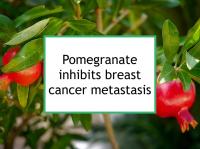Pomegranates have been shown to possess various chemopreventive properties. These properties appear to be due components such as ellagic acid, punicic acid, ursolic acid, and several anthocyanin pigments. Pomegranate extracts have been shown to exert antiproliferative effects on human breast cancer cells.
This includes hormone receptor positive (ER+/PR+), triple negative (ER-/PR-/HER2-), and HER2-positive (HER2+) cells. Now a new study has reported that pomegranate juice and the combination of luteolin, ellagic acid, and punicic acid inhibit metastatic processes in breast cancer cells.
Pomegranate anti-breast cancer properties
Studies have reported the following anti-breast cancer activities of pomegranates and pomegranate compounds:
- Pomegranate seed oil, fermented pomegranate juice polyphenols, and ellagic acid have all been shown to inhibit angiogenesis in breast cancer cells
- Several pomegranate-derived compounds have been shown to inhibit aromatase (in which androgens are converted to estrogens) in breast cancer cells
- Ellagic acid has been shown to delay first tumor appearance by three weeks in a rat model of breast cancer. A total of 69% of treated rats developed palpable tumors by week 26, compared to 100% of rats that did not receive ellagic acid
- Pomegranate fermented juice polyphenols and pomegranate seed oil have also been shown to reduce the number of carcinogen-induced mammary tumors in mice
- Pomegranate juice has been found to inhibit proliferation of ER- breast cancer cells in a dose- and time-dependent manner to a degree comparable to that of high-dose cisplatin chemotherapy
- Punicic acid, a component of pomegranate seed oil, has also been found to reduce the growth and proliferation of ER- breast cancer cells
- Delphinidin, a major anthocyanin present in pomegranates, has been shown to possess potent antioxidant and antiproliferative properties in HER2+ breast cancer cells
- Pomegranate extract has been found to greatly inhibit tumor growth in Her2/neu transgenic mice.
The safety and efficacy of consumption of large doses of pomegranate seed oil and pomegranate extract needs to be confirmed in large-scale clinical trials.
Latest research finds pomegranate inhibits metastasis
The study referenced at the beginning of this news article was designed to investigate the actions of pomegranate juice and three of its chemopreventive components in triple negative and hormone receptor positive breast cancer cells.
To conduct the study, the authors used triple negative MDA-MB-231, hormone receptor positive MCF-7, and non-cancerous MCF-10A cells. The cells were treated with pomegranate juice or a combination of luteolin, ellagic acid, and punicic acid.
In addition to inhibiting the growth of the breast cancer cells, pomegranate juice or the combination of luteolin, ellagic acid, and punicic acid were found to increase breast cancer cell adhesion (thereby helping to keep the cells together) and reduce migration. The treatments also inhibited the action of a compound that attracts breast cancer cells to bone. However, the treatments did not affect normal breast cells.
The authors also demonstrated that both pomegranate juice and the combination of luteolin, ellagic acid and punicic acid stimulated the expression of genes that increase breast cancer cell adhesion, as well as inhibiting genes that stimulate cell migration and inhibit breast cancer cells movement to the bone. In addition, the treatments reduced pro-inflammatory compounds, meaning that they could reduce inflammation and its promotion of cancer progression.
The authors conclude that pomegranate juice and the combination of luteolin, ellagic acid, and punicic acid inhibit metastatic processes in breast cancer cells.
Please see our articles on pomegranates and what ER+/PR+ and triple negative breast cancer patients and survivors should eat for more information.
